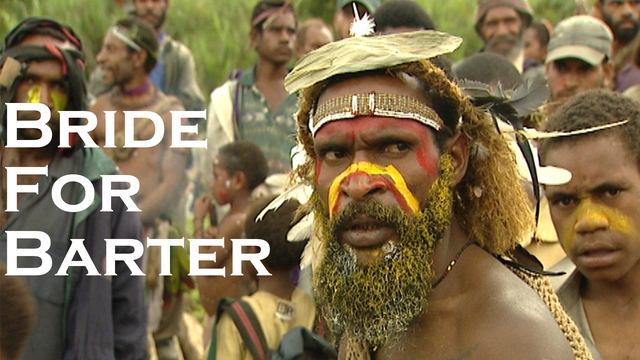Bride for Barter
Stuck between ancestral values and an ever changing modern world, the Huli people of Papua New Guinea find themselves struggling to maintain their tribal identity. An empathetic look at life's daily struggles.
 For hundreds of years, the Huli of Papua New Guinea lived by their ancient customs, relying on tradition to govern all aspects of life. Then the white man came, threatening their unique culture. Stuck between ancestral values and an ever changing modern world, they found themselves struggling to maintain their tribal identity.
For hundreds of years, the Huli of Papua New Guinea lived by their ancient customs, relying on tradition to govern all aspects of life. Then the white man came, threatening their unique culture. Stuck between ancestral values and an ever changing modern world, they found themselves struggling to maintain their tribal identity.
"When the white man came we believed they were the spirits of our ancestors who had arisen from the dead," recalls one tribal elder. "We fled for our lives into the caves." But this retreat only delayed the inevitable. Fifteen months later the white man returned.
In the fifty years that have followed, the Huli have been forced to make a number of radical changes. Their Stone Age subsistence has been replaced by a monetary economy and now they buy food from a local supermarket. But there is not enough work to go round and life is increasingly difficulty. Many are also angry that their land was appropriated by white settlers who offered them no compensation. "They stole our land and we worked for nothing," complains one bitterly.
Since the 1997 regional elections, local people have been deprived of even the most basic services. The main road is closed due to ethnic tensions and banks refuse to open in fear being robbed. As traditional structures of authority disappear, more and more men are aimlessly drifting. Aids and drug addiction have taken hold of the community. "It is getting worse because of the white influence - heroin, marihuana and drinking beer," complains Michael Yaparia. "Ten years ago we'd never heard of prostitutes."
Not all the changes that have occurred have been for the worse. The introduction of Christianity has challenged patriarchal notions and now girls have the opportunity to attend school. "Church has made changes to the family lifestyle," says Luan Nasnas. "Once a man and a woman lived in separate houses, now they live together as one family." The different churches have played an important role in developing the country's health and education institutions.
However some Huli practices still persist, such as the custom of brideprice. Marriage occurs when the bridegroom's family pays his wife's family a suitable brideprice - normally 15 to 30 pigs. "Pigs are more important than women," explains one Huli. While men are allowed to be polygamous, woman are forbidden from having more than one husband and are subservient to their husband's demands.
The government strongly encourages the Huli to maintain their traditional customs and a valuable tourist trade has developed around it. But the Huli themselves have not seen the benefit of this new trade. Nevertheless, they recognise the importance of protecting their threatened culture. As Luan Nasnas explains: "We want to keep the Huli culture alive because it is better for future generations."
FULL SYNOPSIS
